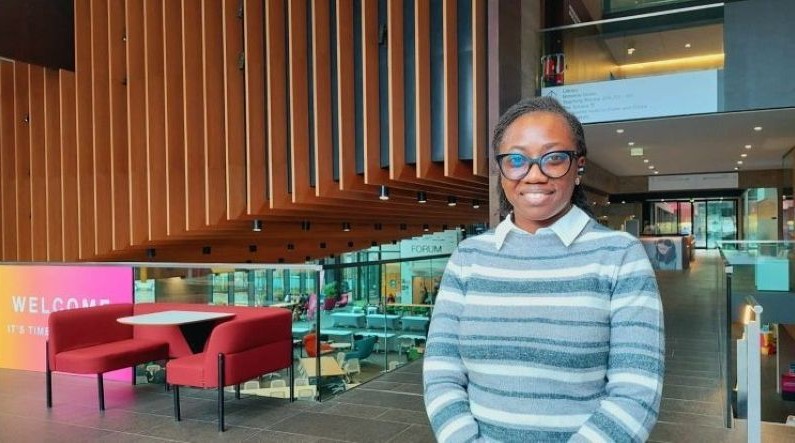Faculty of Health, Science and Technology research students profiles
Thesis title: Improving Support for Acute Oncology Patients: a Mixed Methods Study with Patients and Healthcare Professionals
Started: January 2025
Director of Studies: Dr Lucy McGeagh
Where are you from?
I’m originally from Worcestershire, but I’ve lived in Oxford for twenty years.
How did you hear about Oxford Brookes University?
When I moved to Oxford, I knew little about Brookes, but I gradually met more people connected with the University and heard more about it, building up a positive picture.
Brookes hold regular Science Bazaars, a community event full of hands-on science activities for children. I’ve been bringing my own children to them for years and it helped me to realise what a great place Brookes is. The people here are lovely, and the atmosphere is innovative and welcoming.
What attracted you to Oxford Brookes University to conduct your research?
I was looking for PhD opportunities as I neared the end of Brookes’ Psychology MSc. Fortunately, this funded position came up that seemed made for me, combining my interests in health, psychology and mixed-methods research, within the Supportive Cancer Care Research Group, who have a great deal of experience in this area. Being local to where I live is a massive bonus.
What were you doing before?
I was a hospital clinical pharmacist, which I loved, but after a career break due to ill health and having children, I decided to have a change of direction. I completed the psychology conversion MSc at Oxford Brookes part-time, which was a fantastic course that I would highly recommend. It was great preparation for this PhD.
How easy did you find it to settle into the research environment?
Having recent experience of Brookes and having completed my Masters dissertation meant that the transition onto the PhD was pretty smooth for me.
When I started the MSc, I made a point of reading information on the website and wandering around the site so that I was largely aware of what was available and how to access it. There is so much to be aware of that it can seem overwhelming, but the website is informative and there is always someone to ask and point you in the right direction if you aren’t sure.
My supervisory team is incredibly supportive, and people are very approachable and generous with their time and expertise. It’s a very welcoming research environment.
Tell us about your research
My research aim is to understand the experience of acute cancer-related hospital care from the perspectives of both patients and the healthcare professionals who provide this care.
Acute care refers to a short-term but immediate medical need. For cancer patients, this can arise from the side effects of anti-cancer treatments, symptoms or progression of the cancer itself, or other medical issues related to their cancer diagnosis. Some patients may receive a cancer diagnosis during an emergency admission, either due to symptoms they presented with or incidentally, such as the discovery of a tumour during a scan for an unrelated head injury.
These situations can be incredibly stressful, as they encompass both urgent health needs and concerns about cancer. Currently, our understanding of these experiences is limited and under-researched. Incorporating the voices of patients and staff into service improvements aligns with the NHS 10 Year Health Plan, and I hope that this research will help provide that voice.
I will conduct interviews with patients and healthcare professionals to gather insights about their individual experiences. I will then analyse this information to identify common themes and factors influencing those experiences. This understanding will help pinpoint areas where support can be improved, primarily for patients, but also for healthcare workers.
Practically speaking, there is a limited budget for implementing changes within the NHS. Therefore, I will consider the priorities, feasibility, and specific barriers to implementing potential changes through a survey of healthcare professionals. This approach aims to ensure that the resulting set of recommendations focuses on areas where they will be the most efficient and effective.
What do you enjoy about being a research student?
One of the most challenging aspects of the PhD, particularly when you have children, can be fitting everything into your life. My husband is supportive, and we make things work between us, but it does take planning. Fortunately, a PhD can be quite flexible, as I certainly end up working weekends and unsociable hours when I need to.
My research area really interests me, and I hope that the research will be impactful and useful, which is motivating. Working alongside so many interesting people across the university and hearing about their research projects is also inspiring and makes you feel part of something bigger.
What do you think about the research training offered at Oxford Brookes?
There have been a lot of training opportunities available, with a mix of online and in-person seminars and sessions. I try to attend as many of these as I can, as I find that you sometimes end up learning the most unexpectedly useful things at the sessions you think you might not need.
They also help you to feel connected to other people, which is important as I think a PhD has the potential to feel very lonely if you don’t put yourself out there. It’s good to put faces to names and find out who you could ask if you need help with any problems you come up against in your research.
What are your future plans?
Academia and research really appeal, but I know the current research climate and intense competition might make this challenging. My plan is to be open to opportunities and try to create my own opportunities too.
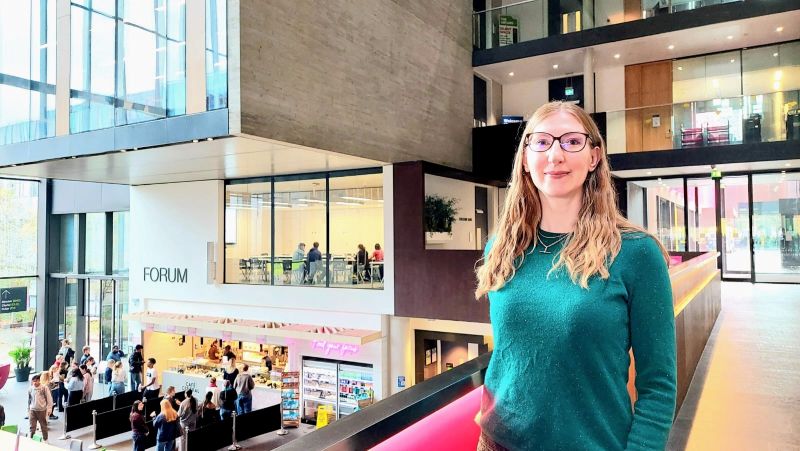
Thesis title: Supporting bereaved children in adult intensive care unit: an experience-based co-design study exploring the perspectives of children, surviving primary carers, and ICU healthcare professionals.
Started: September 2023
Director of Studies: Dr Mark Burgess
Where are you from?
I was born in Bristol but I have lived in Oxford for 18 years!
How did you hear about Oxford Brookes University?
I first became aware of Oxford Brookes through its strong reputation in nursing and healthcare education - and as a student myself. I completed my BSc here before returning to undertake both my MSc in Education and, later, an MSc in Psychology. Having studied at Brookes across different stages of my career, I knew first-hand the quality of teaching, research expertise, and supportive community.
What attracted you to Oxford Brookes University to conduct your research?
The decision to return for my PhD felt like a natural next step after completing an MSc in Psychology. As a Senior Lecturer in the Oxford School of Nursing and Midwifery, I am already embedded in the academic and professional community here.
The Centre for Psychological Research offers a rich interdisciplinary environment. Staying at Brookes allows me to connect my teaching, practice, and research in a way that benefits all three.
What were you doing before?
Before starting my PhD, I was (and continue to be) a Senior Lecturer in the Oxford School of Nursing and Midwifery. My career began as an ICU nurse, where I gained first-hand insight into the complex emotional and practical challenges faced by critically ill patients and their families. I later worked as a childhood bereavement support practitioner, supporting children and young people through the loss of a significant adult.
This combination of frontline clinical experience and specialist bereavement support informs every aspect of my research. Alongside teaching, I have been actively involved in national and international critical care committees, which has helped shape the direction and relevance of my doctoral work
How easy did you find it to settle into the research environment?
Settling in was easy - I already knew the Brookes community well from previous study, but the research environment offered new opportunities for connection and collaboration.
The graduate training programme provides excellent workshops, and there is a strong culture of pastoral and academic support through supervisors, peer networks, and the Graduate College. The library and specialist research services have also been invaluable in accessing cross-disciplinary literature.
Tell us about your research
Bereavement in the adult intensive care unit (ICU) is often sudden and occurs in an unfamiliar, highly medicalised environment. For families - and especially children - this can be profoundly distressing. Evidence shows that honest, age-appropriate communication helps children process grief and reduces the risk of long-term psychological harm. Yet, in practice, children are often excluded from ICU bereavement processes, with adults avoiding difficult conversations or using unclear language to shield them from distress.
Despite the growing recognition of the importance of child-inclusive bereavement support, ICU healthcare professionals report feeling unprepared and uncomfortable discussing death with children. Current guidelines offer little practical guidance, leading to widely inconsistent - and sometimes absent - support across ICUs.
My PhD, Supporting bereaved children in adult intensive care: an experience-based co-design study exploring the perspectives of children, surviving primary carers, and ICU professionals, aims to address this gap. Using an experience-based co-design (EBCD) methodology, I am working directly with bereaved children, their surviving primary carers, and ICU nurses to explore lived experiences and identify what best supports children during this critical time.
The study includes:
- A UK and EU-wide scoping survey of existing bereavement support practices
- Semi-structured interviews with ICU nurses, surviving primary carers, and bereaved children
- Focus groups with families to explore experiences in greater depth
- Collaborative workshops bringing together ICU professionals, parents, and children to co-produce practical recommendations and tools for child-centred ICU bereavement care
The findings will contribute to the development of evidence-based, co-produced recommendations that can be implemented in adult ICUs, helping ensure children are recognised, supported, and given an informed voice during one of life’s most difficult moments.
What do you enjoy about being a research student?
I enjoy the space to think deeply about an issue I feel passionately about, and the opportunity to work closely with people whose lived experience can shape meaningful change in practice. The collaborative and creative nature of experience-based co-design makes the research process itself highly rewarding.
Balancing my PhD alongside my academic role is the biggest challenge. I manage this by setting clear weekly goals, ring-fencing dedicated time for research and writing, and using project management tools to keep everything on track. A supportive supervisory team has also been key to maintaining focus and momentum.
What do you think about the research training offered at Oxford Brookes?
The training is excellent, both in breadth and depth. Workshops on qualitative analysis, ethics in research with vulnerable populations, and public engagement have been directly relevant. The training has strengthened my methodological approach, informed my ethical planning, and helped me prepare for effective dissemination.
What are your future plans?
I aim to translate my PhD findings into practical resources and guidance that can be adopted across ICUs nationally and internationally.
In the longer term, I hope to secure funding for intervention studies to evaluate their impact, and to continue contributing to national and international policy development for child-inclusive bereavement care in critical care settings.
Thesis title: Uses of music across the lifespan
Started: September 2023
Director of Studies: Dr Clare Rathbone
Where are you from?
Watchfield, England
How did you hear about Oxford Brookes University?
I live in Oxfordshire, so I was always aware of Oxford Brookes University, but I began seriously considering completing a PhD at Oxford Brookes after a friend of mine began her Law degree here and was full of praise for her course. At this time, I had just completed my master's degree in psychology, so I was looking at potential PhD courses, and Brookes seemed like a great campus full of friendly faces. In particular, I was impressed by the psychology department, which has excellent facilities and impactful and interesting research output.
What attracted you to Oxford Brookes University to conduct your research?
I found a studentship advertised on the Oxford Brookes website about conducting a project based on music engagement across the lifespan and decided to apply. The opportunity to be funded and research a topic I have always been interested in under the supervision of leading researchers encouraged me to apply. The excellent facilities and accessible campus were also bonuses.
What were you doing before?
Before I started my PhD course, I had just finished an MSc in Clinical Psychology at the University of Bath. My dissertation investigated the relationship between attention and recognition memory for the early detection of Alzheimer’s Disease. I also worked part-time as a rehabilitation worker for people with brain injuries at Headway UK. Although both were valuable experiences, I was looking to progress into academia rather than clinical, and the studentship at Brookes seemed the perfect opportunity to make this transition and investigate music and brain injury rehabilitation, both of which are my research interests.
How easy did you find it to settle into the research environment?
Due to my previous experience as a research assistant, I found it fairly easy to settle into the research environment. However, this process was made easier through the college induction programme and the support of my supervisors and postgraduate tutor. I think excellent support and resources are available to research students within the department and college. There is a good training programme and any resources needed for your research can be met.
Tell us about your research
Listening to music is an important aspect of daily life that helps to shape identity, manage mood, and relieve boredom. However, as adults age, their engagement with music and reasons for listening to music change. In particular, enjoyment of intense contemporary music such as rock and rap decreases, as does the tendency to listen to music while completing other tasks and exploration of new music. This may be due to changing priorities and goals associated with the challenges of life roles such as student or parent. Furthermore, our ever-evolving sense of identity and increasing emotional intelligence may also reduce the need for music to manage our moods or express ourselves. Music has been found to improve the well-being of young adults, but we live in an ageing society, so it is important to understand how music can affect the well-being of older people. However, research concerning music engagement across the lifespan is relatively scarce, and findings are inconsistent and inconclusive. Therefore, my research aims to re-examine whether identity, emotional intelligence, and life roles can affect music engagement across the lifespan. I am currently investigating this using a questionnaire study where I will compare results across age groups from 16-80.
In the older population, the prevalence of brain injuries is rising. Listening to music whilst completing rehabilitation tasks can improve recovery in memory and attention for brain injury patients. Specifically, listening to music produced when patients were 10-30 years old may lead to significant improvements in cognitive function. These improvements may be due to the reminiscence bump, where events from these ages are more likely to be remembered than events from other ages. However, interestingly, these improvements are more notable among individuals with brain injuries than healthy controls. This illustrates the potential to use music from the reminiscence bump to improve rehabilitation outcomes. However, no studies have investigated the effect of music from the reminiscence bump on cognition in individuals with brain injuries. Therefore, my project also aims to explore music engagement in individuals with brain injuries and critically evaluate whether music can affect cognitive performance in individuals with brain injuries. I will investigate this through a combination of interviews and experimental studies.
What do you enjoy about being a research student?
The best thing about being a research student is the opportunity to conduct and publish your own research. I enjoy discussing research ideas and hearing about others' research, and the PhD community is so supportive and helpful. The biggest challenge so far has been juggling many different tasks and deadlines, but I find keeping an organised calendar and setting myself tasks to complete each day helps me stay on track.
What do you think about the research training offered at Oxford Brookes?
The research training offered at Oxford Brookes is extensive and covers many aspects of completing a research degree from initial registration through to submission and publishing. This has been a helpful resource for answering questions, understanding expectations, and de-mystifying the process.
What are your future plans?
My future plans are to stay within academia, eventually becoming a lecturer and having the opportunity to develop studies from my thesis, such as creating a music-based intervention for brain injury rehabilitation.
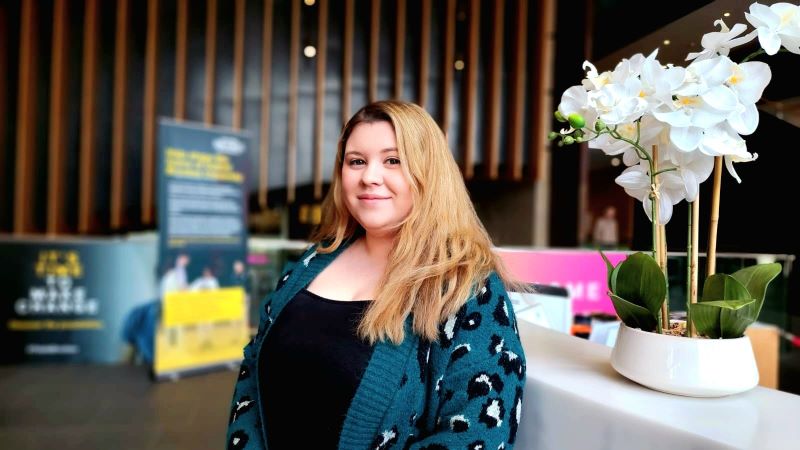
Thesis title: Regulation and functional implications of sexual dimorphism in eye morphology in Drosophila melanogaster
Started: September 2024
Director of Studies: Dr Maike Kittelman
Where are you from?
Sri Lanka
How did you hear about Oxford Brookes University?
I first came across Oxford Brookes University while I was doing my Master’s at the University of Manchester and actively looking for PhD opportunities. Through the “Find a PhD” website, I found several projects that closely matched my research interests, particularly those using Drosophila melanogaster as a genetic model, which aligned well with my previous experience.
I was also aware of Oxford Brookes’ strong reputation as a research-focused university. In addition, one of the universities in Sri Lanka has an affiliation with Oxford Brookes University, and several of my friends completed their final year at Brookes before graduating. They shared very positive feedback about both the academic environment and the support they received, which gave me extra confidence in choosing Oxford Brookes as the right place for my research journey.
What attracted you to Oxford Brookes University to conduct your research?
I was initially drawn to Oxford Brookes because the project was fully funded, which made it possible for me to pursue my PhD in a supportive and well-resourced environment. The facilities were another key factor, especially the Bioimaging Centre, which provides access to advanced equipment such as scanning electron microscopes and high-resolution fluorescence microscopes. These tools allow researchers at Brookes to investigate developmental processes and morphological differences, and having hands-on experience with this technology is valuable for my training as a researcher.
When I looked into potential supervisors, I found that Dr. Maike Kittelmann was highly regarded in the field, with research that strongly aligned with my background and interests. This gave me the confidence to apply, knowing that I would be guided by an expert in the area. After starting my PhD, I also discovered how welcoming and collaborative the research group is, which has been another motivating factor and has made my research experience even more rewarding.
What were you doing before?
Before starting my PhD at Oxford Brookes, I was completing my second Master of Science degree in Clinical Biochemistry at the University of Manchester, where I studied under the Women in STEM scholarship.
This experience not only strengthened my academic foundation in molecular and biomedical sciences but also gave me the opportunity to refine my analytical and research skills in a world-class academic environment.
How easy did you find it to settle into the research environment?
Settling into the research environment at Oxford Brookes was very smooth. My supervisor made sure that I had all the resources and materials I needed as soon as possible, which allowed me to get started on my project without unnecessary delays. This level of support made a big difference in helping me adjust quickly and feel confident in my research.
The facilities and resources available to research students are excellent. In particular, the library has been a great resource, not only for accessing a wide range of academic materials but also for providing a quiet and supportive study environment. Combined with the welcoming atmosphere of the research community at Brookes, these resources have made it much easier to settle in and feel at home as a research student.
Tell us about your research
“Sexual dimorphism”, the differences between males and females of the same species, is widespread in nature and shaped by sexual selection. These differences go far beyond reproductive organs, influencing morphology, physiology, and even behaviour. In many animals, sex-specific differences in sensory input and information processing lead to distinct behaviours, but the overall gene regulatory networks that shape sexually dimorphic sensory organs and neural circuits are still poorly understood.
In Drosophila melanogaster (the common fruit fly), sexual dimorphism is clearly visible in the compound eyes. Male and female flies differ not only in overall body size but also in eye size and morphology. Females generally have larger eyes, composed of more and bigger subunits (ommatidia), while males have smaller eyes with fewer ommatidia. However, how these differences are developmentally regulated, and what impact they have on vision and behaviour, remains unknown.
The sex determination pathway in Drosophila is controlled by two major regulators, Sex-lethal (Sxl) and Transformer (Tra). These genes are best known for directing the formation of sex-specific reproductive organs, but recent evidence suggests they also play broader roles in somatic development, including regulation of organ size. Preliminary work has shown that knocking down Sxl in the developing eyes of female flies causes a major reduction in eye size, making them resemble male eyes, whereas knocking down Tra has only minor effects. This raises important questions about how Sxl, and possibly Tra, control eye development and sexual dimorphism more broadly.
My project investigates this by combining genetics, developmental biology, bioimaging, and behavioural analysis. First, I will characterise sexual dimorphism in eye development and morphology by dissecting and imaging eye imaginal discs (small epithelial sacs within a larva that develop into adult appendages and body parts, such as wings, legs, eyes, and antennae, during metamorphosis), building on my prior technical experience with Drosophila dissection and microscopy. I will then test the roles of Sxl and Tra in regulating eye size and identify candidate downstream genes that may act in a sex-specific manner. Finally, I will explore the functional consequences of these developmental differences by analysing how eye size and morphology affect vision-related behaviours in males and females.
This research will clarify how sex-determination genes influence eye development and help explain the genetic and developmental mechanisms behind sexual dimorphism. It will also discuss how gene regulatory networks drive differences in sensory systems and behaviour between males and females.
What do you enjoy about being a research student?
What I enjoy most about being a research student is the freedom to explore questions in depth and the excitement that comes with generating new knowledge. I value the creativity of designing experiments, the problem-solving aspect of research, and the sense of contributing to a bigger scientific conversation.
Being part of an academic community at Oxford Brookes is also very rewarding, exchanging ideas with fellow PhD students and researchers during lab meetings and seminars always gives me fresh perspectives and motivates me to keep pushing forward.
Like most researchers, I face challenges when experiments don’t go as expected or when progress feels slow. These moments can be frustrating, but they have taught me resilience and patience. My strategy is to stay organised, keep backup plans in place, and approach problems systematically rather than getting discouraged.
Discussing ideas with peers and drawing on my supervisor’s guidance has been invaluable for troubleshooting. I will never forget how she always stood beside me, patiently explaining concepts, even repeating them multiple times, to ensure I fully understood. Her support goes beyond research itself, she has also taught me how to maintain a healthy balance between my work and personal life. Her advice often introduced me to new approaches and perspectives that I hadn’t considered, which has been important for both my development as a researcher and my overall wellbeing.
Most importantly, I reminded myself to step back, take breaks, and keep perspective, rather than getting stuck in the cycle of repeating the same thing. In the end, those setbacks actually improved the way I plan and analyse my experiments, and they’ve made me more resilient as a researcher.
What do you think about the research training offered at Oxford Brookes?
The research training offered at Oxford Brookes has been extremely valuable in developing both my technical skills and my broader professional abilities. I have participated in workshops covering data analysis, advanced microscopy techniques, and public engagement, which have helped me approach my research more systematically and communicate my findings effectively.
A particularly exciting opportunity was a one-week training at the Diamond Light Source at the Harwell Campus, where I used my own samples for 3D synchrotron radiation tomography under the guidance of my supervisor. This experience gave me hands-on exposure to advanced imaging techniques and greatly enhanced my technical expertise.
In addition to technical training, the university provides sessions on managing stress and maintaining a healthy work-life balance. These have been very helpful in building resilience and ensuring that I can sustain focus and productivity over the long term. Overall, the combination of technical workshops, practical experiences, and personal development training has made me more confident as a researcher and better prepared for a future career in academia.
What are your future plans?
After completing my PhD, I hope to continue my research as a postdoctoral fellow, building on the skills and expertise I have developed at Oxford Brookes.
In the long term, I am hoping to build a career in research and academia, applying for fellowships and grant opportunities that will allow me to develop independent projects.
I am also open to research roles in collaborative institutes or research centres, where I can contribute my expertise in genetics, imaging, and developmental analysis. Beyond research, I am passionate about mentoring the next generation of scientists and contributing to a more inclusive and supportive scientific community.

Thesis title: The Role of Transposable Elements in Primate Genome Evolution
Started: January 2024
Director of Studies: Dr Ravinder Kanda
Where are you from?
Auckland, New Zealand
How did you hear about Oxford Brookes University?
I heard about Oxford Brookes through findaphd.com when I was looking for projects!
What attracted you to Oxford Brookes University to conduct your research?
I was very inspired by the advertised project and to work with several experts in the field.
What were you doing before?
Before starting my PhD at Oxford Brookes I had finished my Masters at University of Auckland in 2023 and was working at the university as a Postgraduate Teaching Assistant.
How easy did you find it to settle into the research environment?
It was a challenge moving to the other side of the world, but I was able to settle in easily due to the support system at Brookes. My fellow PhD students are all very supportive and nice and made me feel at home and conduct research!
Tell us about your research
My research primarily focuses on identifying endogenous retroviruses in the genomes of Slow Lorises.
Endogenous retroviruses are relics of previously existing active retroviruses, the class of retrovirus which contains HIV. When these retroviruses infect the host they will leave their DNA within the hosts genome and remain.
All animals have these in their genome and occupy as much as 10% of the genome in humans. Majority of these endogenous retroviruses are neutral and thought to be “junk DNA” but further and further research has shown the tremendous impact they have on the genome and organism. For example, syncytin a crucial gene in the development of placenta originates from a retrovirus gene which the genome co-opted for its own use. They have also been linked to numerous diseases.
Slow lorises are a very understudied primate. They are small and nocturnal native to southeast Asia in countries like Thailand, Vietnam, Malaysia and Indonesia. Very little research has been conducted on their genomes and essentially none in the space of endogenous retroviruses.
We are undertaking thorough research of endogenous retroviruses within them to first get a comprehensive oversight of endogenous retroviruses within slow lorises, but also to compare to the larger primates as a large majority of endogenous retrovirus research has been conducted in chimps and humans but little in the smaller primates. We are hoping to examine if trends seen hold true in all primates.
What do you enjoy about being a research student?
I like getting to learn new things and being the first to research something. I also thoroughly enjoy getting to share my research with others.
Burnout and loss of internal motivation can be a challenge, but keeping a good work-life balance helps mitigate it.
What do you think about the research training offered at Oxford Brookes?
The research training provided has been incredibly valuable—not only in enhancing my scientific research skills, but also in improving public engagement, writing, personal growth, career development, and research planning.
I believe this program is equipping me with the tools to become the academic I aspire to be. Oxford Brookes provide many helpful training sessions across the wide array of research.
What are your future plans?
I hope to continue a career in academia and research and teach at a tertiary level.
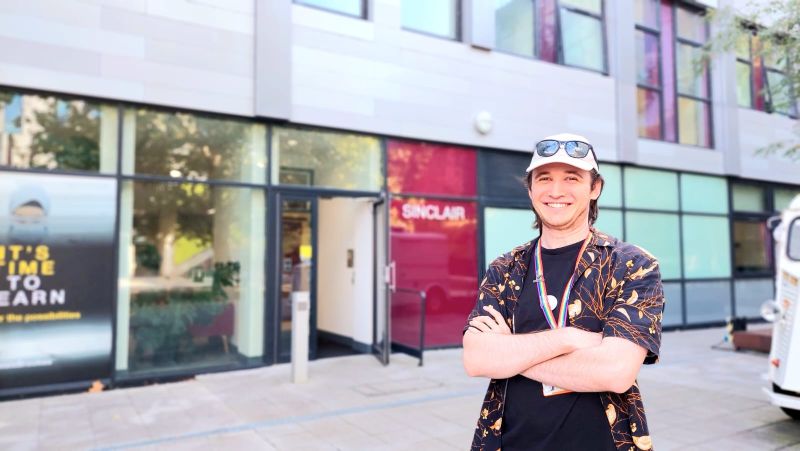
Thesis title: The role of actin isoforms in cancer adhesion of the endothelium during metastasis
Started: September 2023
Director of Studies: Dr Ryan Pink
Where are you from?
Oxfordshire
How did you hear about Oxford Brookes University?
Living locally to Oxford Brookes University meant I heard lots of good reviews from friends. Whilst completing a Biomedical Science undergraduate degree at Brookes the lecturers were very supportive and invited me to join their weekly lab meetings, from there I applied to complete an MSc by Research.
What attracted you to Oxford Brookes University to conduct your research?
The friendly research students and PI’s really do make research at the university an enjoyable environment to be in, plus having access to the fantastic bioimaging unit.
What were you doing before?
I completed A-Levels in Biology, Politics and Drama before opting to continue down a biology route.
How easy did you find it to settle into the research environment?
The research environment was a big change compared with undergraduate study but the supervisors and other post graduate students are all very supportive as well as the university offering inclusive introductory sessions.
Tell us about your research
The metastatic spread of cancer is found to be the cause of over 90% cancer patient death. With this in mind it is important we understand metastatic cancer, pathways that drive this and promote cancer movement. My project looks specifically at cancer cells that have reached the blood and how these become sticky and hijack the body’s natural immune mechanism to then allow the cancer cells back into local tissue which can form a new tumour. This project aims to investigate the spatial expression of actin in breast cancer cells and their role in binding to endothelial cells. Techniques to establish this include a wide range of microscopes, Immunocytofluorescence, flow cytometry and cell culture.
What do you enjoy about being a research student?
I really love all the additional learning that is encouraged, with the goal of 70 hours to help develop personal, professional and career skills. With additional work, comes some difficulties with time management, but with help from supervisors it is easier to prioritise and manage your time more effectively achieving a good balance.
What do you think about the research training offered at Oxford Brookes?
The research training is a great opportunity to begin presenting your results, get to know other research students and find courses that can shape the way you tackle your research.
What are your future plans?
I will be staying at Oxford Brookes to begin a PhD as part of the Groome Studentship in September continuing my current project.
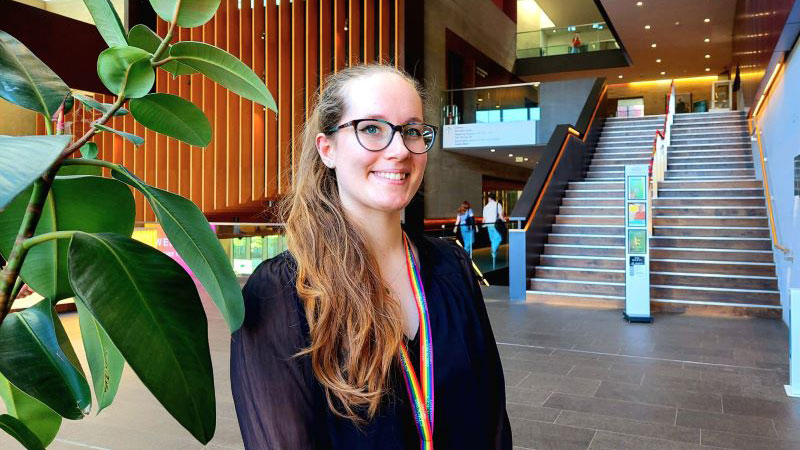
Thesis title: Investigating the Molecular Mechanism of Groucho Protein Function During Development in Drosophila Melanogaster
Started: September 2022
Director of Studies: Dr Barbara Jennings
Where are you from?
Istanbul, Türkiye
How did you hear about Oxford Brookes University?
When I was looking for PhD positions through different portals, I came across Oxford Brookes University. Unfortunately, I didn’t attend a postgraduate fair, as I was living in a different country back then. However, my first impression of Brookes was very positive.
What attracted you to Oxford Brookes University to conduct research?
The project Barbara offered was just what I was looking for. In addition, I wouldn’t be able to do my PhD without funding, therefore being able to receive Nigel Groome Studentship was an essential addition to my decision too.
What were you doing before?
I was doing my Master’s degree at Acıbadem Mehmet Ali Aydınlar University in İstanbul, Türkiye. My thesis was on the co-occurrence of 3 SNPs on BRCA1 gene and how it affects breast cancer formation. At the same time, while doing my MSc and after I graduated until I started my PhD, I was a Research Assistant at the same university for 3 years.
How easy did you find to settle into the research environment?
Settling into the research environment was fairly easy as I had experience before. Barbara and Korneel supported and trained me to make sure I would have a head start in the research environment. In addition, other PhD candidates were amazingly helpful. Especially the support I have with my supervisory team is one of the driving force of my PhD. Resources available at Brookes are very inclusive and helpful, not only academically but also personally.
Tell us about your research.
Precise control of gene expression in response to developmental and environmental cues is essential for life. Transcription factors (TFs) play a key role in regulating the spatial and temporal expression profiles of many genes during animal development. The Gro/TLE/Grg family of proteins are recruited by many TFs to repress gene expression during a variety of biological processes. Gro is also highly conserved across evolution and has many homologs and orthologs. Previous studies (using overexpression analysis) have indicated that post-translational modifications including oligomerisation and phosphorylation may play an important role in regulating Gro’s activity as a repressor. However, the importance of these post-translational modifications on Gro function during development is as yet unknown. We are aiming to uncover mechanisms through which TFs and Gro proteins function together to inhibit gene expression, focusing on the role of post-translational modifications to Gro in fly.
What do you enjoy about being a research student?
Being able to study an area that I am interested in such depth definitely first comes to mind. I enjoy researching, learning, being able to contribute, and being part of academia. I faced a long-term challenge with my research this year, the experiments were not working as we expected and unfortunately, I was not able to progress. Both of my supervisors supported me throughout this time with different strategies, and I learned something from both during this stage. I tried to stay calm, be as rational as possible, and try to figure out the problem while also conducting backup plans. I also made sure I was checking myself and my health on a regular schedule and talked with other researchers to gain perspective both academically and personally.
What do you think about the research training offered at Oxford Brookes?
The research training offered is very helpful, not only for scientific research but also for public engagement, writing, self-improvement, career development, and research planning. I think this program is preparing me to become the academic I am dreaming to be.
What are your future plans?
I would like to continue with my research as a post-doc researcher and I am planning to stay in academia.
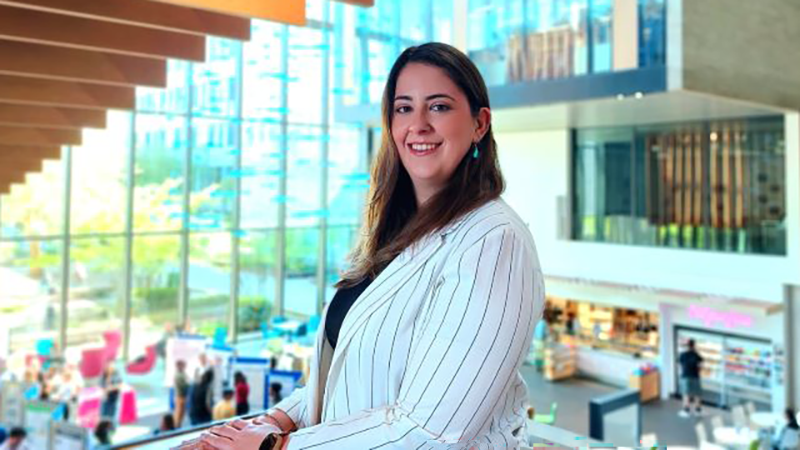
Thesis title: Genome Scale Metabolic Modelling to Identify Changes in Metabolic Responses of Pathogenic Bacteria to Antibiotic Challenges.
Started: 1 November 2021
Director of Studies: Dr Mark Poolman
Where are you from?
India
How did you hear about Oxford Brookes University?
I heard about OBU from the PhD advertisement at EURAXESS website.
What attracted you to Oxford Brookes University to conduct your research?
I was attracted to both research group and scholarship. I am a Marie-Sklodowska Curie Actions fellow. My research group at OBU, i.e., Cell Systems Modelling group is focussed on modelling metabolic networks of cell systems, for a holistic understanding of metabolism, which forms a part of broader field of systems biology.
What were you doing before?
I have done my undergrad and masters in Microbiology with Honours from Univerity of Delhi and Kurukshetra University, India, respectively.
I did my first research job as a Research Fellow (Research fellow is position in India which is equivalent to Post Grad Research Assistant in the UK) in Department of Medical Microbiology at Post Graduate Institute of Medical Education and Research, Chandigarh, India. The project was to identify the role of anaerobic bacteria present in gut as a reservoir for Antimicrobial Resistance (AMR).
After that, I was working as a Research Fellow in Molecular Imaging and Diagnostics Lab at Indian Institute of Technology, Delhi. The project was jointly funded by UK ESRC and Department of Biotechnology, Government of India. The aim of the project was to develop user driven, innovative diagnostics to curb AMR. My role was to develop in-house buffers to extract bacterial DNA from urine samples, to be used in a microfluidic chip which was being developed as a diagnostic tool.
How easy did you find it to settle into the research environment?
I found it really comfortable to settle into the research environment because of all the support and resources provided by the university. My supervisor has been really supportive throughout my journey. Since I transitioned from a “wet lab” to a “dry lab”, it was a big change at first, but I really enjoyed learning new techniques and the importance of computational aspects in biological research.
I taught a Masters course on Object-oriented programming as a part of my training which was really helpful in my PhD. As a part of my PhD project, I got the opportunity to travel to different countries in Europe and attend training courses for experimental techniques such as proteomics, transposon sequencing, drug screening, etc. I also did a secondment of 11 weeks as a part of my PhD at University of Copenhagen last year.
Tell us about your research.
My research project is a part of INNOTARGETS-ITN. It is a EU Horizon 2020 MSCA-ITN consortium of academic and industrial partners, the main objective of which is to apply innovative approaches for identifying metabolic drug targets in resistant pathogenic bacteria. The aim of this project is to use genome scale metabolic modelling and to integrate experimental data generated by the collaborators into the model, for exploring metabolic response of resistant bacteria when it is grown in the presence of antibiotics.
Metabolic modelling establishes a mathematical representation of the reactions present in the metabolic system under study including the inputs in the form of components of growth media and outputs in the form of biomass components. Models are typically constructed from online databases and can be analysed by a number of established techniques, including:
- Identifying the groups of reactions working together in a metabolic network (Enzyme subsets).
- Identifying the groups of reactions which form minimal independent pathways in a metabolic network (Elementary modes).
- Identifying the sets of reactions that fulfil a given function (Linear Programming).
In this project, a genome scale metabolic model (GSM) of E.coli MG1655 has been constructed using an available genomic database (EcoCyc) which contains genes and reactions present in the organism. The model was then curated by checking for energy conservation and biomass formation by applying LP to GSM. In addition to model construction and curation, the techniques to integrate experimental data into the GSM have been developed and the model has been analysed to identify changes in metabolic pathways required for growth under antibiotic challenges.
Integration of different kinds of experimental data into modelling analysis will help in developing new techniques for exploring how bacterial metabolism is involved with AMR and potentially in identifying novel drug targets.
What do you enjoy about being a research student?
I enjoy learning new things every day which is the beauty of research. Being a PhD student gives you freedom to explore your research topic as much as you can, but sometimes pressure to finish in time and failures can be major challenges. I try to balance my work and life and treat my PhD as any 9 to 5 job. My supervisor always suggests taking breaks and weekends seriously so that you can come back to the problems with a fresh perspective.
Although there are never-ending deadlines in a PhD, I like to have a deadline because it keeps you in check and you become aware of your time and manage it accordingly. Annual progress reports really help in the process of writing as they are short documents which help in giving a kickstart to thesis writing.
What do you think about the research training offered at Oxford Brookes?
Graduate college trainings offered at OBU are really helpful as they are designed to help develop transferable skills required for research irrespective of the field of expertise. I would also like to highlight the importance of library services as the inter-library loans services for research papers which are not open and accessible have been really helpful during my PhD.
I have benefitted from them a lot, because they not only prepare you for finishing your PhD, but also prepare you for the job market after your PhD in the form of courses related to networking in conferences etc. I have presented my research in a lot of International conferences and symposiums organised in my research group during my PhD. I have also assisted my supervisor in conducting Metabolic modelling workshops and Python teaching courses.
I feel that doing PhD at OBU has given me a wide range of skill sets including not only research, but also transferable skills which will help me in my future endeavours.
What are your future plans?
My future plans are to get a research based job in the field of computational biology in academia or industry, preferably related to drug discovery and AMR.

Thesis title: Nutritional and Genetic Risk Factors in the Progression of Mild Cognitive Impairment to Alzheimer’s Disease
Started: January 2025
Director of Studies: Professor Shelly Coe
Where are you from?
Nigeria
How did you hear about Oxford Brookes University?
I completed an MBA at Oxford Brookes University in 2012 and fell in love with it since then! I have always had a very positive impression of the University.
What attracted you to Oxford Brookes University to conduct your research?
As I had studied here before, I loved how involved the lecturers were and had a very supportive supervisor. When I decided to do a PhD, I knew I had to do it at Oxford Brookes University because of its sense of community and strong reputation for research excellence, knowledge transfer and impact.
What were you doing before?
I worked as a business analytics consultant and obtained a second degree via online distance learning from the University of Glasgow
How easy did you find it to settle into the research environment?
It has been a wonderful experience! My supervisors have been very supportive, and I love the updates and support from the Research Degrees team. There is a wide range of training sessions for skills and career development which is very encouraging.
Tell us about your research.
Neurodegenerative diseases, particularly Alzheimer’s disease (the most common form of neurodegenerative diseases) pose a growing public health challenge.
Studies suggest that while genetic factors are responsible for about 80% of the development of Alzheimer’s disease, modifiable lifestyle factors such as nutrition and diet play a vital role in onset and progression of Alzheimer’s disease.
However, there are limited studies investigating the interaction between nutrition and genetic predisposition in Alzheimer’s progression. Therefore, my research aims to investigate potential interactions between dietary patterns and genetic variants, and the influence on cognitive decline to provide intervention strategies for slowing the progression of mild cognitive impairment to Alzheimer’s disease.
I am currently conducting a systematic review and meta-analyses to identify genetic variants in young onset and late onset, including key micronutrients/ nutrients and their potential role in slowing the progression of mild cognitive impairment to Alzheimer’s disease. This will be followed by a synthesis of the evidence supporting the role of long-term nutrition interventions in improving cognition.
What do you enjoy about being a research student?
I love meeting other research students, getting to know about their research and how different our journeys are. Having an office space to work in has been helpful for meeting and interacting with other people. I am also enthusiastic about the opportunity to publish my research. I value the resources and trainings available to develop myself.
What do you think about the research training offered at Oxford Brookes?
The training is encouraging and helpful in transitioning into being a full-time researcher. It has also helped me in understanding expectations and timelines to plan properly. This has allowed me to get opportunities within and outside the University that are related to my research.
What are your future plans?
Being at Oxford Brookes University has informed my decision to continue as a researcher in higher education or academia, and develop more research based on my findings. I also look forward to being fully integrated into the University’s research team.
